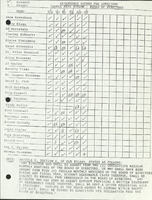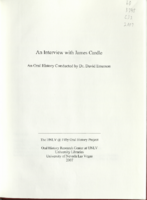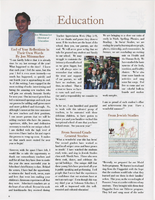Search the Special Collections and Archives Portal
Search Results

Transcript of interview with Brian Cram by Stefani Evans and Claytee White, October 28, 2016
Date
Archival Collection
Description
Throughout his career, former Clark County School District Superintendent (1989–2000) Brian Cram took his father's words to heart. He heard them repeatedly over the years as he watched and later, helped, his father clean classrooms at Robert E. Lake Elementary School: this place—the classroom—this is the most important place. Cram was born in Caliente, where his father worked on the railroad. In 1939, when Cram was a toddler, the family moved to Las Vegas and his father found work first as a sanitation engineer at a hospital, and then at CCSD as a custodian. The elder Cram, who spent his formative years in the Great Depression, prided himself on doing "good, honorable work" as a custodian, because the work—the classroom—mattered. Even so, he wanted more for his son. Cram largely ignored his father's advice during his four years at Las Vegas High School, where he ran with The Trimmers car club, wore a duck tail and a leather jacket, and copped an attitude. Cram's swagger, though, d
Text

Minutes from Temple Beth Sholom Board of Directors meetings, June 1988 - May 1989
Date
Archival Collection
Description
Meeting minutes include reports from committees of the board, correspondence, and balance sheets.
Text
Craddock, Patricia Carmichael
Ms. Patricia Craddock was born in Las Vegas in 1928. In this interview, she discusses growing up in Las Vegas, becoming a teacher, the educational system in Nevada. She also discusses the perception of Las Vegas from other people across the country, and recrational activities available to young people at the time.
Person
Meyer, Yvonne, 1935\-....
Ballerina and dance teacher, born in Rio de Janeiro, Brazil.
Director of the Académie de Danse Montparnasse
Danced with Ballet de France Janine Charrat, Les Etoiles de Paris de Serge Lifar, National Ballet Washington D.C., and many others
Person
Christiansen, Norman, 1931-
Norman Christiansen was born on October 11th, 1931 in Red Lodge, Montana. He moved to Las Vegas, Nevada in 1956 after graduating college in Montana. Christiansen worked at the Nevada Test Site for two years and was a teacher at various schools.
Person
Frankie Perez oral history interview
Identifier
Abstract
Oral history interview with Frankie Perez conducted by Elsa Lopez and Laurents Bañuelos-Benitez on November 05th, 2018 for the Latinx Voices of Southern Nevada Oral History Project. Perez speaks about the importance of sports, and the lack of Latinx representation in teachers during high school. Perez then discusses being placed on medical hold in the military, how his transition affected his physical tests, how the 2016 election may have impacted transgendered people in the military, and how everyday military personnel feel about transgendered people serving in the military. The interview concludes with Perez discussing the Lesbian, Bisexual, Gay, Transgendered, and Queer (LGBTQ) scene in Las Vegas, Nevada and about how culture impacts which clubs members of LBGTQ community would visit.
Archival Collection
Carolyn Whaley oral history interview
Identifier
Abstract
Oral history interview with Carolyn Whaley conducted in 2005 by an unknown interviewer for the UNLV University Libraries Oral History Collection. Whaley discusses her early interest in music and her successful audition for the United States Air Force Women's Air Force (WAF) Band in 1959. She explains that the band was the only all-female band in the military between 1951 and 1961, and shared a number of stories about the function and activities of the band. Later, she discusses her civilian career as a music teacher in Barstow, California and decision to move to Las Vegas, Nevada after her retirement in 2000. She also remarks on the lack of interest that officials at Nellis Air Force Base in Las Vegas showed in veterans.
Archival Collection
Gerardo Topacio, Philomena Topacio, and Teresa Prezgay oral history interview
Identifier
Abstract
Oral history interview with Gerardo Topacio, Philomena Topacio, and Teresa Prezgay conducted by Claytee D. White on April 13, 2018 for the Boyer Early Las Vegas Oral History Project. In this interview, Gerardo discusses his early life in Manila, Philippines. He remembers the attacks in Pearl Harbor on December 07, 1941, the Japanese and Philippines conflict, and immigrating to the United States. Gerardo talks about his employment with Edgerton, Germeshausen, and Grier, Inc. (EG&G) and working at the Nevada Test Site. Philomena recalls her career in the hotel industry and being a member of the Culinary Workers Union Local 226. The couple was joined by their daughter, Teresa Prezgay. Prezgay talks about her career as a math teacher and promotes the increase of women in science, technology, engineering and mathematics (STEM) fields.
Archival Collection

Transcript of interview with James Cardle by Dr. David Emerson, April 25, 2006
Date
Archival Collection
Description
Text

